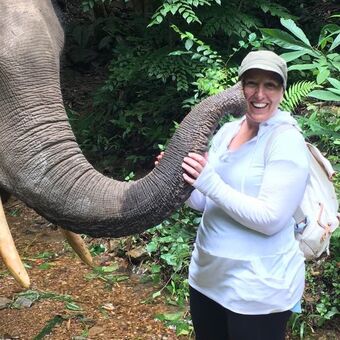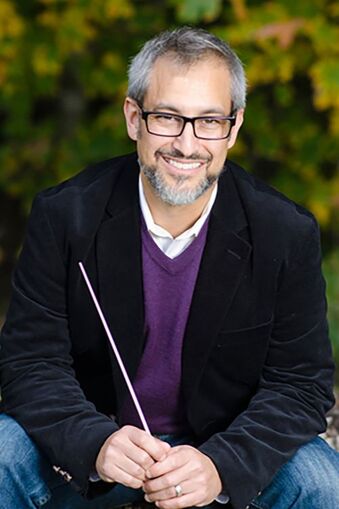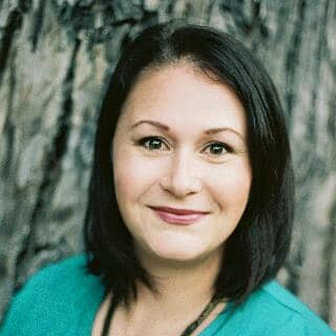
Monica J. Casper, Phytophile and Editor-In-Charge
Monica’s first gardening memory was picking dandelions to adorn her mud pies. This was in Chicago in the 1970s, when apartment living was the thing, halter tops were in, and gardens were few and far between. Summer life was lived in neighborhood parks, cooling off under sprinklers, or playing on the beach.
When Monica was 11, her family moved to rural Wisconsin, where she befriended kids who actually grew things, like on farms. Many of her friends were in 4H, and some kept horses, cows, and other animals. Monica’s parents, Pat and Denny, planted a garden in the backyard of their old house, where they grew vegetables and herbs to cook with and to put up for the winter. There were fragrant lilacs, too.
Subsequent moves – to California, to the Pacific Northwest, to Nashville, to the Southwest – offered ample opportunity to discover new soils, biomes, microclimates, plants, and nurseries. And also to explore beautiful gardens and arboretums, where Monica has long found joy and solace (and ideas), especially after breakups and other major life events. Since 2001, these experiences have been shared with her daughters, who are not (yet) gardeners but who appreciate beauty.
Recently, Monica left her desert home in Tucson, where she gardened and communed with javelina, coyote, hawks, and clear skies, for a new job and home in Southern California. She and her family now live in a revamped 1963 house in San Diego County, where she intends to create a native garden out of half an acre of dirt and dried leaves. The yard came with several beautiful native trees, including California live oak, but there is plenty of room to create the perfect refuge and enticing habitat for the area's birds and insects.
Monica’s primary professional identities are sociologist and writer, and her most cherished personal identity is Mom to her daughters, ages 22 and 20. But her avocation is gardening. An urban working-class kid who made mud pies with dandelions still plays in the dirt, and is ecstatic to do so. She believes gardening is its own kind of creativity, one that can change lives, communities, and the planet.
Monica’s first gardening memory was picking dandelions to adorn her mud pies. This was in Chicago in the 1970s, when apartment living was the thing, halter tops were in, and gardens were few and far between. Summer life was lived in neighborhood parks, cooling off under sprinklers, or playing on the beach.
When Monica was 11, her family moved to rural Wisconsin, where she befriended kids who actually grew things, like on farms. Many of her friends were in 4H, and some kept horses, cows, and other animals. Monica’s parents, Pat and Denny, planted a garden in the backyard of their old house, where they grew vegetables and herbs to cook with and to put up for the winter. There were fragrant lilacs, too.
Subsequent moves – to California, to the Pacific Northwest, to Nashville, to the Southwest – offered ample opportunity to discover new soils, biomes, microclimates, plants, and nurseries. And also to explore beautiful gardens and arboretums, where Monica has long found joy and solace (and ideas), especially after breakups and other major life events. Since 2001, these experiences have been shared with her daughters, who are not (yet) gardeners but who appreciate beauty.
Recently, Monica left her desert home in Tucson, where she gardened and communed with javelina, coyote, hawks, and clear skies, for a new job and home in Southern California. She and her family now live in a revamped 1963 house in San Diego County, where she intends to create a native garden out of half an acre of dirt and dried leaves. The yard came with several beautiful native trees, including California live oak, but there is plenty of room to create the perfect refuge and enticing habitat for the area's birds and insects.
Monica’s primary professional identities are sociologist and writer, and her most cherished personal identity is Mom to her daughters, ages 22 and 20. But her avocation is gardening. An urban working-class kid who made mud pies with dandelions still plays in the dirt, and is ecstatic to do so. She believes gardening is its own kind of creativity, one that can change lives, communities, and the planet.

Matthew Melendez, Co-Editor and Tender Perennial
Matthew’s passion is making music with people who don’t think of themselves as musicians.
His community ensembles have been invited to perform at the White House and at Lincoln Center, and in 2019 he made his Carnegie Hall debut while leading his completely unauditioned youth and adult choirs in a world-premiere choral cantata commissioned specially for the occasion (to which they received a rousing standing ovation and very positive review).
He has a masters degree in vocal performance and pedagogy, and his doctoral research focuses on the sociological effects of participatory music making. Through his organization, the Great Bend Center for Music, he designs and delivers programs that build community by bringing people of all ages and socioeconomic backgrounds together through classes, sing-alongs, ensembles, and more.
When not being musical, Matthew can usually be found with his son planting seeds, building new raised beds, chatting with their amiable flock of chickens, or playing with one of three different composting systems to make more soil. As a result, each year Matthew’s family puts up gallons of garlic dill pickles, raspberry and strawberry jam, hash brown potatoes, herb pestos, roasted tomato sauce, and more while also enjoying a regular supply of beans, squash, plums, apples, lettuce, and kale from their large orchard garden on the south shore of Hood Canal in beautiful Western Washington.
Matthew’s passion is making music with people who don’t think of themselves as musicians.
His community ensembles have been invited to perform at the White House and at Lincoln Center, and in 2019 he made his Carnegie Hall debut while leading his completely unauditioned youth and adult choirs in a world-premiere choral cantata commissioned specially for the occasion (to which they received a rousing standing ovation and very positive review).
He has a masters degree in vocal performance and pedagogy, and his doctoral research focuses on the sociological effects of participatory music making. Through his organization, the Great Bend Center for Music, he designs and delivers programs that build community by bringing people of all ages and socioeconomic backgrounds together through classes, sing-alongs, ensembles, and more.
When not being musical, Matthew can usually be found with his son planting seeds, building new raised beds, chatting with their amiable flock of chickens, or playing with one of three different composting systems to make more soil. As a result, each year Matthew’s family puts up gallons of garlic dill pickles, raspberry and strawberry jam, hash brown potatoes, herb pestos, roasted tomato sauce, and more while also enjoying a regular supply of beans, squash, plums, apples, lettuce, and kale from their large orchard garden on the south shore of Hood Canal in beautiful Western Washington.

November Prentiss, Web Design and Token Non-Gardener
November comes from a long line of gardeners and handy toilers. A practiced hand with rototillers, weed wackers, chainsaws, and other power tools, November lost the art and joy of gardening to a youth laboring as a tamer of wild spaces.
Arizona, with its hidden sprigs of green amid arrays of clay, red, and brown soils, inspired a passion for xeriscaping. November enjoys maintaining her yard with indigenous plants and the least amount of work imaginable.
While she aspires to have a maintenance-free yard, November seeks the beautiful chaos of nature amid the trees and scrubs. Trails, mountain paths, and quiet perches feed her need for nature.
November, despite best of intentions and hours cultivating soil, has accepted her expertise at growing digital content.
November comes from a long line of gardeners and handy toilers. A practiced hand with rototillers, weed wackers, chainsaws, and other power tools, November lost the art and joy of gardening to a youth laboring as a tamer of wild spaces.
Arizona, with its hidden sprigs of green amid arrays of clay, red, and brown soils, inspired a passion for xeriscaping. November enjoys maintaining her yard with indigenous plants and the least amount of work imaginable.
While she aspires to have a maintenance-free yard, November seeks the beautiful chaos of nature amid the trees and scrubs. Trails, mountain paths, and quiet perches feed her need for nature.
November, despite best of intentions and hours cultivating soil, has accepted her expertise at growing digital content.